动词时态总结表
(完整版)英语动词时态归纳总结对照表
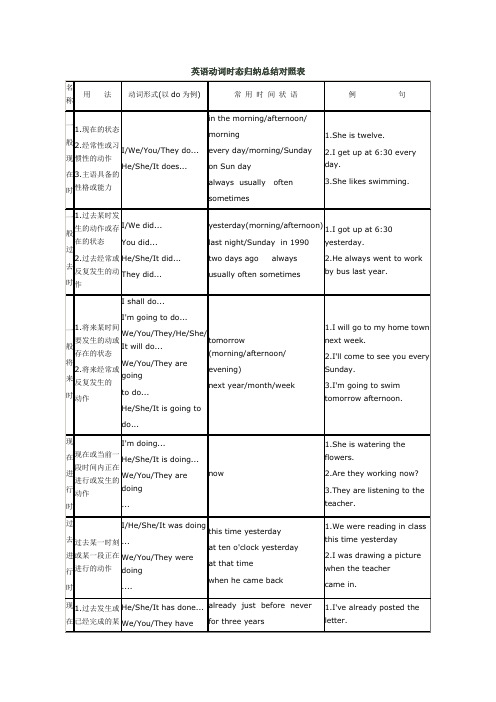
英语动词时态归纳总结对照表英语时态专项练习1、一般现在时。
通常用“usually, often, every day, sometimes”。
一般现在时基本用法介绍一、一般现在时的功能1.表示事物或人物的特征、状态。
如:The sky is blue.天空是蓝色的。
2.表示经常性或习惯性的动作。
如:I get up at six every day.我每天六点起床。
3.表示客观现实。
如:The earth goes around the sun.地球绕着太阳转。
二、一般现在时的构成:肯定句:1).主语+系动词 be(is, am, are )+名词(形容词,介词短语)2) .其他主语+动词原形+其它第三人称单数+动词-s+其它如:I am a boy.我是一个男孩。
We study English.我们学习英语。
Mary likes Chinese.玛丽喜欢汉语。
三、一般现在时的变化否定句:1)主语+ be (is,am,are)+ not +其它。
如:He is not a worker.他不是工人。
2)其他主语+do not(don’t)动词原形+其它I don't like bread第三人称单数+does not(doesn’t)动词原形+其它He doesn't often play.一般疑问句:1)Be(Is,Are) +主语+其它?如:-Are you a student? -Yes. I am. / No, I'm not.2)Do其他主语+动词原形+其它?Does+第三人称单数+动词原形+其它+?注意:遇I/we—you, my—your, some—any.Does she go to work by bike? - Yes, she does. / No, she doesn't.Do you often play football?- Yes, I do. / No, I don't.特殊疑问句:疑问词+一般疑问句。
动词时态和语态总结
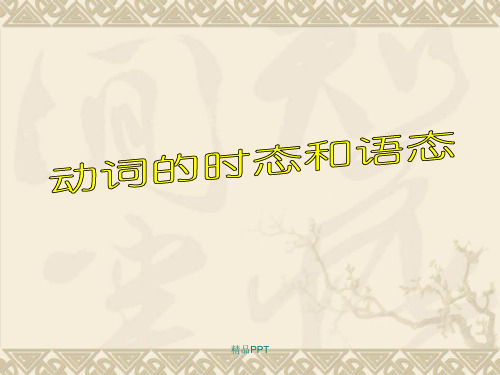
四、现在进行时 1.表示说话时正在进行而尚未完成的动作或状态。
We are having an English lesson. 2.表示现阶段一直在进行的动作,但说话时不一定正在进行。
The workers are building a new factory.
3.有时可表示即将发生的动作〔只限于go, come, stay, leave, start, begin, arrive, return, fly, drive等动词〕这时常有一个
played table tennis almost everyday. 4〕在条件、时间状语从句中表示过去将来的动作。
They said they wo精u品lPdPTlet us know if they heard any news about him.
三. 一般将来时 一般将来时表示将来要发生的动作和存
精品PPT
二、一般过去时 1〕表达特定的过去时间内发生的动作或存在的状况,
常与last week/year/ month/ spring, a few days ago, in 1998等时间状语以及when等连词引
导的时间状语从句连用。
We had a good swim last Sunday.
3〕用在问句中,表示委婉礼貌; Will you be reading anything else? When shall we be meeting again?
When I was young, I took cold baths regularly. 2〕表达过去连续发生的一件件事。
He got up early in the morning, fetched water,
常见英语时态总结表
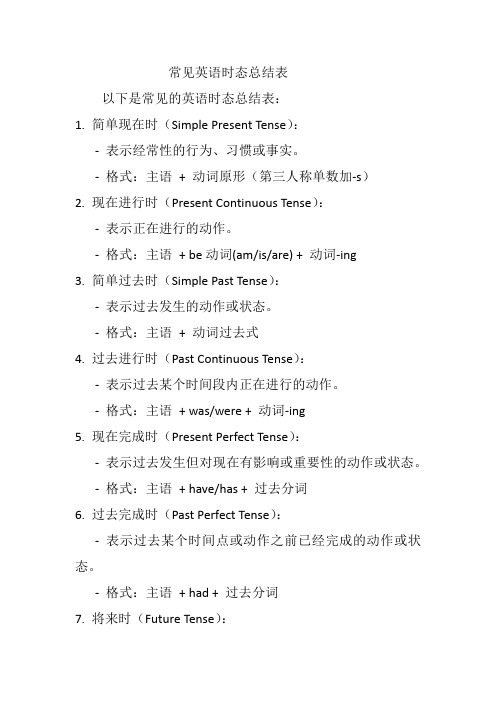
常见英语时态总结表以下是常见的英语时态总结表:1. 简单现在时(Simple Present Tense):- 表示经常性的行为、习惯或事实。
- 格式:主语+ 动词原形(第三人称单数加-s)2. 现在进行时(Present Continuous Tense):- 表示正在进行的动作。
- 格式:主语+ be动词(am/is/are) + 动词-ing3. 简单过去时(Simple Past Tense):- 表示过去发生的动作或状态。
- 格式:主语+ 动词过去式4. 过去进行时(Past Continuous Tense):- 表示过去某个时间段内正在进行的动作。
- 格式:主语+ was/were + 动词-ing5. 现在完成时(Present Perfect Tense):- 表示过去发生但对现在有影响或重要性的动作或状态。
- 格式:主语+ have/has + 过去分词6. 过去完成时(Past Perfect Tense):- 表示过去某个时间点或动作之前已经完成的动作或状态。
- 格式:主语+ had + 过去分词7. 将来时(Future Tense):- 表示将来要发生的动作或状态。
- 格式:主语+ will/shall + 动词原形8. 进行时态(Continuous Tenses):- 表示动作的持续性,与时间相关。
- 包括现在进行时、过去进行时和将来进行时。
9. 完成时态(Perfect Tenses):- 表示动作的完成性,与时间相关。
- 包括现在完成时、过去完成时和将来完成时。
这只是一个简单的总结,每个时态都有更多的应用和用法。
在实际使用中,需要注意时态的准确性和上下文的适应性。
动词时态语式总结
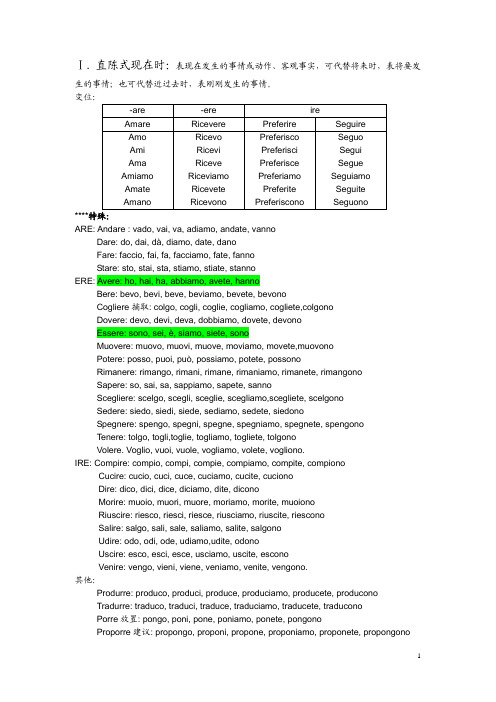
Ⅰ. 直陈式现在时:表现在发生的事情或动作、客观事实,可代替将来时,表将要发生的事情;也可代替近过去时,表刚刚发生的事情。
变位:-are -ere ireAmare Ricevere Preferire SeguireAmo Ami Ama Amiamo Amate AmanoRicevoRiceviRiceveRiceviamoRiceveteRicevonoPreferiscoPreferisciPreferiscePreferiamoPreferitePreferisconoSeguoSeguiSegueSeguiamoSeguiteSeguono****特殊:ARE: Andare : vado, vai, va, adiamo, andate, vannoDare: do, dai, dà, diamo, date, danoFare: faccio, fai, fa, facciamo, fate, fannoStare: sto, stai, sta, stiamo, stiate, stannoERE: Avere: ho, hai, ha, abbiamo, avete, hannoBere: bevo, bevi, beve, beviamo, bevete, bevonoCogliere摘取: colgo, cogli, coglie, cogliamo, cogliete,colgonoDovere: devo, devi, deva, dobbiamo, dovete, devonoEssere: sono, sei, è, siamo, siete, sonoMuovere: muovo, muovi, muove, moviamo, movete,muovonoPotere: posso, puoi, può, possiamo, potete, possonoRimanere: rimango, rimani, rimane, rimaniamo, rimanete, rimangonoSapere: so, sai, sa, sappiamo, sapete, sannoScegliere: scelgo, scegli, sceglie, scegliamo,scegliete, scelgonoSedere: siedo, siedi, siede, sediamo, sedete, siedonoSpegnere: spengo, spegni, spegne, spegniamo, spegnete, spengonoTenere: tolgo, togli,toglie, togliamo, togliete, tolgonoVolere. Voglio, vuoi, vuole, vogliamo, volete, vogliono.IRE: Compire: compio, compi, compie, compiamo, compite, compionoCucire: cucio, cuci, cuce, cuciamo, cucite, cucionoDire: dico, dici, dice, diciamo, dite, diconoMorire: muoio, muori, muore, moriamo, morite, muoionoRiuscire: riesco, riesci, riesce, riusciamo, riuscite, riesconoSalire: salgo, sali, sale, saliamo, salite, salgonoUdire: odo, odi, ode, udiamo,udite, odonoUscire: esco, esci, esce, usciamo, uscite, esconoVenire: vengo, vieni, viene, veniamo, venite, vengono.其他:Produrre: produco, produci, produce, produciamo, producete, produconoTradurre: traduco, traduci, traduce, traduciamo, traducete, traduconoPorre放置: pongo, poni, pone, poniamo, ponete, pongonoProporre建议: propongo, proponi, propone, proponiamo, proponete, propongonoContrarre缔结: contraggo, contrai, contrae, contraiamo, contraete, contraggono.Trarre拖,拉: traggo, trai, trae, traiano, traete, traggono. ………………………………………………………………………………………………………..Ⅱ.近过去时:构成:avere,essere +动词的p。
动词时态总结
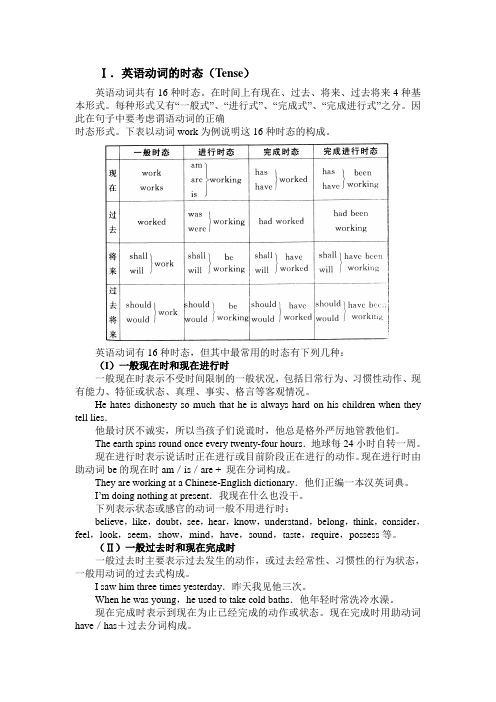
Ⅰ.英语动词的时态(Tense)英语动词共有16种时态。
在时间上有现在、过去、将来、过去将来4种基本形式。
每种形式又有“一般式”、“进行式”、“完成式”、“完成进行式”之分。
因此在句子中要考虑谓语动词的正确时态形式。
下表以动词work为例说明这16种时态的构成。
英语动词有16种时态,但其中最常用的时态有下列几种:(I)一般现在时和现在进行时一般现在时表示不受时间限制的一般状况,包括日常行为、习惯性动作、现有能力、特征或状态、真理、事实、格言等客观情况。
He hates dishonesty so much that he is always hard on his children when they tell lies.他最讨厌不诚实,所以当孩子们说谎时,他总是格外严厉地管教他们。
The earth spins round once every twenty-four hours.地球每24小时自转一周。
现在进行时表示说话时正在进行或目前阶段正在进行的动作。
现在进行时由助动词be的现在时am/is/are + 现在分词构成。
They are working at a Chinese-English dictionary.他们正编一本汉英词典。
I’m doing nothing at present.我现在什么也没干。
下列表示状态或感官的动词一般不用进行时:believe,like,doubt,see,hear,know,understand,belong,think,consider,feel,look,seem,show,mind,have,sound,taste,require,possess等。
(Ⅱ)一般过去时和现在完成时一般过去时主要表示过去发生的动作,或过去经常性、习惯性的行为状态,一般用动词的过去式构成。
I saw him three times yesterday.昨天我见他三次。
英语十六种动词时态归纳表
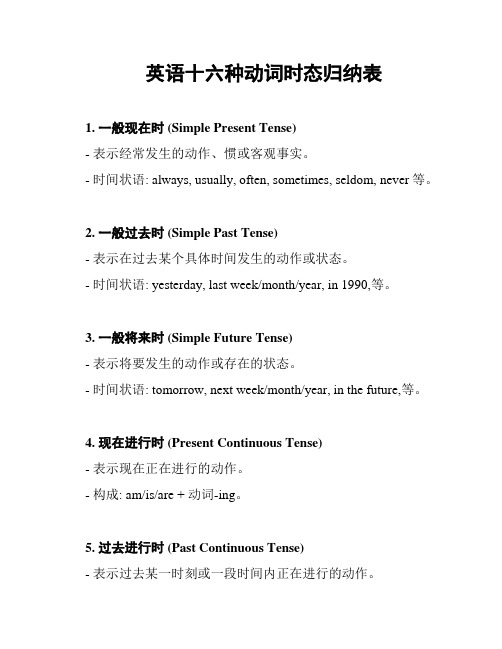
英语十六种动词时态归纳表1. 一般现在时 (Simple Present Tense)- 表示经常发生的动作、惯或客观事实。
- 时间状语: always, usually, often, sometimes, seldom, never等。
2. 一般过去时 (Simple Past Tense)- 表示在过去某个具体时间发生的动作或状态。
- 时间状语: yesterday, last week/month/year, in 1990,等。
3. 一般将来时 (Simple Future Tense)- 表示将要发生的动作或存在的状态。
- 时间状语: tomorrow, next week/month/year, in the future,等。
4. 现在进行时 (Present Continuous Tense)- 表示现在正在进行的动作。
- 构成: am/is/are + 动词-ing。
5. 过去进行时 (Past Continuous Tense)- 表示过去某一时刻或一段时间内正在进行的动作。
- 构成: was/were + 动词-ing。
6. 将来进行时 (Future Continuous Tense)- 表示将来某一时刻或一段时间内正在进行的动作。
- 构成: will be + 动词-ing。
7. 现在完成时 (Present Perfect Tense)- 表示动作对现在造成的影响或状态。
- 构成: have/has + 过去分词。
8. 过去完成时 (Past Perfect Tense)- 表示在过去某一时间点或动作之前已经发生的动作。
- 构成: had + 过去分词。
9. 将来完成时 (Future Perfect Tense)- 表示在将来某一时间点之前将会发生的动作。
- 构成: will have + 过去分词。
10. 现在完成进行时 (Present Perfect Continuous Tense)- 表示从过去某一时刻开始一直延续到现在且可能继续下去的动作或状态。
初中英语动词时态归纳总结对照表
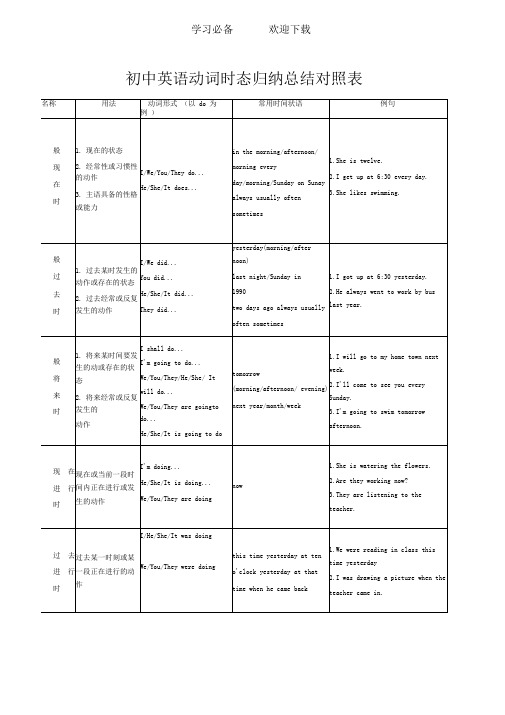
学习必备欢迎下载初中英语动词时态归纳总结对照表初中英语时态专项练习1、 一般现在时。
通常用 “ usually, often, every day, sometimes ”。
一般现在时基本用法介绍 一、一般现在时的功能1. 表示事物或人物的特征、状态。
如: The sky is blue. 天空是蓝色的。
2. 表示经常性或习惯性的动作。
如: I get up at six every day. 我每天六点起床。
3. 表示客观现实。
如: The earth goes around the sun. 地球绕着太阳转。
二、一般现在时的构成 : 肯定句 :1). 主语 +系动词 be(is, am, are )+ 名词(形容词,介词短语)2) . 其他主语 +动词原形 +其它第三人称单数 +动词 -s+ 其它 如: I am a boy. 我是一个男孩。
现 在完成 时过 去完成 时 现 1. 过去发生或已经 完成的某一动作对 现在造成的影响或 结果2. 表示过去已经开 始并持续到现在的 动作或状态过去某一时间前已 经发后的动作或状 态He/She/It has doneWe/You/They haveI/We/You/He/She/I t had done ⋯⋯.already just beforene verfor three years since 1990 this morning these daysby the end of ⋯when+ 一般过去时 before+ 一般过去时1.I've already posted the letter.2.We have known each other for ten years.3.They lived here since 1997.4.Have you ever been to Beijing?1.I had learned 2000 words by the end of last term.2.When I got out,the bus had already left.在完成 进 行 时现在以前的一段时 间里一直进行的动 作,这个运作可能 仍在进行 , 也可能 继I/We/You/They have been doing ⋯. He/She/It has been doing ⋯.since nine o ' clock for five hours1.I have been skating for five hours.2.She has been skating since nine o ' clock..We study English. 我们学习英语。
动词时态总结一览表
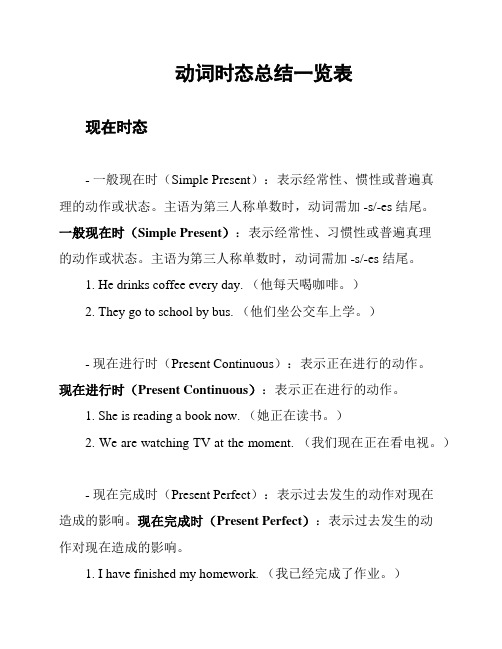
动词时态总结一览表现在时态- 一般现在时(Simple Present):表示经常性、惯性或普遍真理的动作或状态。
主语为第三人称单数时,动词需加 -s/-es 结尾。
一般现在时(Simple Present):表示经常性、习惯性或普遍真理的动作或状态。
主语为第三人称单数时,动词需加 -s/-es 结尾。
1. He drinks coffee every day. (他每天喝咖啡。
)2. They go to school by bus. (他们坐公交车上学。
)- 现在进行时(Present Continuous):表示正在进行的动作。
现在进行时(Present Continuous):表示正在进行的动作。
1. She is reading a book now. (她正在读书。
)2. We are watching TV at the moment. (我们现在正在看电视。
)- 现在完成时(Present Perfect):表示过去发生的动作对现在造成的影响。
现在完成时(Present Perfect):表示过去发生的动作对现在造成的影响。
1. I have finished my homework. (我已经完成了作业。
)2. They have lived here for two years. (他们在这里住了两年了。
)- 现在完成进行时(Present Perfect Continuous):表示动作从过去一直延续到现在。
现在完成进行时(Present Perfect Continuous):表示动作从过去一直延续到现在。
1. They have been playing basketball for two hours. (他们已经打了两个小时的篮球了。
)2. I have been studying English for five years. (我已经研究英语五年了。
)过去时态- 一般过去时(Simple Past):表示过去某个时间发生的动作或状态。
- 1、下载文档前请自行甄别文档内容的完整性,平台不提供额外的编辑、内容补充、找答案等附加服务。
- 2、"仅部分预览"的文档,不可在线预览部分如存在完整性等问题,可反馈申请退款(可完整预览的文档不适用该条件!)。
- 3、如文档侵犯您的权益,请联系客服反馈,我们会尽快为您处理(人工客服工作时间:9:00-18:30)。
动词时态总结表
1、习惯动作
2、普遍常识
3、主将从现often, always, usually, everyday主将从现
常用于:
1、时间、条件、让步状语从句中
2、火车、飞机、安排仅限于少数表短暂意义v、一般过去时V、过去式过去动作/状态yesterday, last year, the other day, just now, then, two days ago, at that time动词过去式变化(如study-studied; refer-referred)一般将来时
1、will/shall do
2、 be going to do
3、 be to do
4、 be about to do将发生/计划开展tomorrow, the day after tomorrow, next week, in two hours, after2
o’clockshall一般用于第一人称,will可用于各种人称现在进
行时is/am/are doing
1、现在/现阶段正发生
2、反复/习惯动作(情绪)now, at present Look! 不用于
进行时的V、consist, exist, remain, belong to, like, hate, taste, smell,etc、过去进行时was/were doing过去某时(段)
正在发生was/were doing…when…现在完成时have/has done发生在过去,持续至今或还将继续
1、It (This)
is the best (worst, most interesting)+n、 that sb、has done
2、 It (This)
is (will be)
the first /second、、、time that sb、 has done过去完成时had done过去的过去
1、句中有明显参照动作或时间状语(before, after, by, up till)
2、 by, by the end, by the time, until, before,
since+ _____动作,主句用完成时
1、hardly(scarcely)、、、when 、、、, no
sooner 、、、than 、、、2、 It (This)
was the first /second、、、time that sb、 had done将来完成时will/shall have done在将来某时刻前已完成或一直持续的动作,并对将来产生一定影响by+______时间/动作
when/before引导的时状区分过去完成时和将来完成时在by引导的时间状从中的运用过去将来时
1、would do
2、was/were going to do
3、 was/were to do
4、 was/were about to do
1、立足过去看将来
2、过去的动作习惯或倾向was/were about to do…when…语法填空
1、Failure _____(be)
the mother of success、
2、 The teacher said that the earth _______(go)
round the sun、3、 Daydreams _____(be)
often very simple and direct, quite unlike sleep dreams, which may be hard to understand、4、 Secondary school in the U、S、
A、 usually _________(cover)
seven years, grades six to twelve、
6、I’ll participate in the game if it _______ (do)
rain、7、I’ll let him know as soon as he ________ (come)、8、 Remember to send me a photo of us next time you ______ (write)
to me、
9、 The train _________(leave)
at4:30 p、m、
10、 I can guess you were in a hurry、 You ________ (wear)
your coat inside out、1
1、The workers ___________ (build)
a garden these days、
12、 The book _______(belong)
to her、
13、 He ______ (look)
for a house when he saw an advertisement in a newspaper one day、改错1 He watching TV now 、2、 Look! The boys is playing football、3、 The students are swiming in the pool、4、 Now I am liking walking、5、 He taught English for ten years、6、 He has died for two years、7、 They have already drove to the village、8、She planed to study abroad、9、 He said he will fly a kite that afternoon、
10、 When the time came for me to say goodbye to my friends in the village, I wanted to reward the old woman for the trouble I caused her、 But she refused、。
